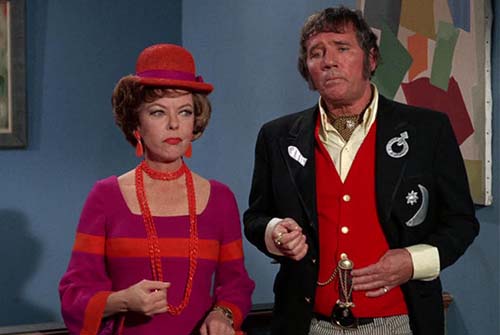Thanks for making this available. I've seen the outline, and thus knew that Cabala originally was the solo villain with two henchmen, and Doc Cassandra did not yet exist. But this is the first time I have seen scripts. The annotations on the first draft are particularly interesting. I'll begin with the first draft.
I noticed right away that Howie Horwitz (I believe that is his handwriting) suggested a 'gal.' (Well, at least he didn't say dame, right?

)
However, by not changing the teaser scene all that much, there is no mystery to the audience. We know it's a woman and a man, no element of surprise that it's an 'invisible woman.'
Of course, I noticed immediately that The Siren originally was one of the EIGHT (!) supervillains sprung from Gotham Prison. I suspect they nixed that because it was not worth spending the time to outfit and coif a stand-in. Too bad. It's not mentioned in the dialogue what Siren's 'cut' would have been. (Record stores, concert halls perhaps?) Shame also was nixed, and that was noted immediately in the annotations. Both were Stanley Ralph Ross originals.
I noticed that someone had crossed out the line in Desmond Doomsday's narration about how the bank is so conservative it pays no interest, and Horwitz wrote, 'put it back, it's funny.' Ross had one of those lines in the stage direction he put in to amuse the actors and the folks at Greenway--'tellers collapse like teenagers at a Beatle (sic) concert' as the invisible baddies knock them over.
How about when Cabala has a line of dialogue, 'I try to do my thing,' and Horwitz circled thing with a question mark. What a square, man. I won't repeat the sexist lines about Batgirl's anatomy, but will note that not only was the key line changed in the aired version, it wasn't in the final draft. I wonder if they were waiting for word from ABC Standards and Practices.
In the first draft, Cabala has the henchmen 'conk' Crichton and the prison captain on their heads to knock them out, and Horwitz writes 'little violent for our format.' Wow, I mean, they could have done the comedic slowly falling down bit. Horwitz then asks 'wasn't she (Batgirl) there once before?,' meaning in the Batcave. Nope. Good when the second-in-command doesn't even know the show's continuity.
Ross' explanation, as spoken by Batgirl, still makes no sense. I still do not understand how turning the lights off helps. The Trio could just as easily hit one another. Also, much like in Hoffman's Londinium rewrite, when did Batman have time to construct an anti Alvino Ray gun device?
The final draft calls Doc Cassandra a 'lovely young sorceress,' which makes one wonder if Ross had someone younger in mind. It's also fascinating that G. David Schine is written IN THE SCRIPT as the floorwalker. Can't remember seeing that in a Bat-script before.
Quick hits: He also used the slang word 'kype' for steal in his Siren teaser; I'm not surprised it was changed in the dialogue. ... I only noticed now, even though I've seen the ep many times, Gordon's line about how 'a Bat-fight seldom takes more than 40 seconds.' How meta is that? ... This had to be a network thing--A line of Alfred's dialogue has 'pray' switched to 'hope.' ... Batman's civic responsibility lecture at the end probably was cut for time. I don't miss it--just reading it, it kind of sounds more Joe Friday than Batman.
Sorry this is so long, but I still don't get the alchemy thing. Alchemy, from what I've read, was concerned mostly with turning base metals into gold or
finding the secret of youth, neither of which factors in here. I also can't stand the whole loser legacy thing, which exists just so Ross can throw off some Borscht Belt one-liners. What is the point of suggesting that your antagonist is likely to be a failure? (I mean, we all know she'll fail, but still)
'I thought Siren was perfect for Joan.'--Stanley Ralph Ross, writer of 'The Wail of the Siren'
My hobbies include gazing at the Siren and doing her bidding, evil or otherwise.
'She had a devastating, hypnotic effect on all the men.'--A schoolmate describing Joan Collins at age 17





